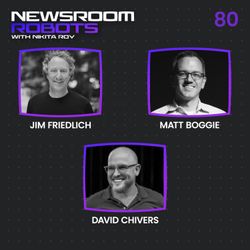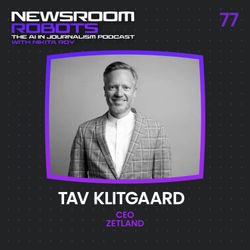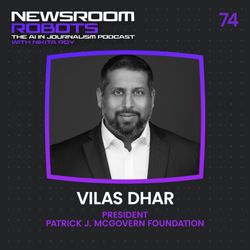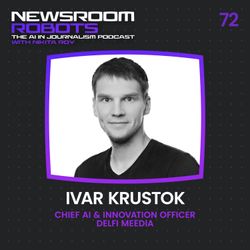Share

Newsroom Robots
Aliya Itzkowitz & Sam Gould (Part One): Insights from FT Strategies' AI Design Sprint Day
Aliya Itzkowitz and Sam Gould from FT Strategies join Nikita Roy to discuss their AI Design Sprint that they used to help nearly 20 publishers identify and validate potential AI opportunities.
Aliya is a Manager at FT Strategies where she has consulted over 30 publishers across Europe, Asia, Africa and North America. Her work focuses on the critical shifts facing publishers today, including rethinking revenue models and understanding how to leverage AI. Before the FT, she worked at Dataminr, bringing AI technology to newsrooms, and at Bloomberg as a journalist. Aliya has a BA from Harvard University and an MBA from the University of Oxford.
Sam is a data scientist at FT Strategies and has worked in consulting, helping clients to solve strategic business challenges using data. He has helped organizations in both the public and private sectors, from tech to healthcare to consumer products, define their AI roadmaps and strategies. He has also worked as a data scientist, designing and building data and AI systems. Sam designed the FT Strategies AI Design Sprint methodology working in partnership with the Google News Initiative.
Sign up for the Newsroom Robots newsletter for insights from host Nikita Roy.
More episodes
View all episodes

Alessandro Alviani & Fabian Heckenberger: How Germany’s Süddeutsche Zeitung is building AI products that audience can trust
59:31|By 2026, most leading newsrooms have moved past the question of whether AI belongs in their organization. Now the key question is: what does a sustainable AI product strategy look like when you’re building for a subscription-based business and a high-trust brand?This week on Newsroom Robots, host, Nikita Roy sits down with Alessandro Alviani, Lead for Generative AI, and Fabian Heckenberger, Managing Editor for AI, at Germany’s Süddeutsche Zeitung to discuss how they’re using AI to build the next generation of news products.This conversation looks at what happens when AI becomes a permanent layer in a newsroom’s product stack. Alessandro and Fabian walk through how they’re designing AI experiences that fit naturally with reader behavior and how they’re developing new distribution and accessibility formats that would have been impossible to sustain manually.This episode also goes deep on a topic that’s becoming a defining competency which is operational trust. What do you monitor once an AI product is live? How do you categorize failures? And how do you respond quickly when something goes wrong, without panic and without eroding your brand?This episode, we cover:02:52 — How editorial and product roles complement each other in AI strategy13:13 — Addressing skepticism and fear around AI in the newsroom25:17 — Inside building the German election chatbot31:10 — The design framework that signals AI content without eroding trust35:30 — Real-time risk management and monitoring for live AI tools48:50 — The two questions every newsroom should ask before greenlighting an AI project54:55 — Closing reflections and personal AI useSign up for the Newsroom Robots newsletter for episode summaries and insights from host Nikita Roy.
Francesco Marconi & Scott Austin: 2025 Year in Review, What Actually Changed in AI and Media
01:12:23|2025 wasn’t just another year of AI experimentation in the media industry. It forced the industry to confront a bigger question: what happens when AI stops being just a newsroom tool and becomes the layer audiences experience journalism through? That is the core question heading into 2026.This week on Newsroom Robots, host Nikita Roy sits down with Francesco Marconi and Scott Austin for an end of year recap roundtable on what actually changed in AI and media in 2025 and what newsroom leaders need to prepare for heading into 2026.Francesco is the co-founder and CEO of AppliedXL. He previously led R&D at The Wall Street Journal and built some of the earliest AI and newsroom automation systems at The Associated Press.Scott leads business development at Symbolic.ai, an AI assisted publishing tool. He is also a journalist and digital media veteran who spent years at The Wall Street Journal as a reporter and award winning editor, and later led content partnerships at Dow Jones across major platforms.This episode covers:03:10 — Why 2025 was journalism’s operational reckoning year08:55 — The shift from search to answers and why it breaks old business models14:40 — Proactive AI and what ChatGPT Pulse reveals about the next distribution layer20:30 — Journalism’s hidden work and why persistence, source building, and human judgment still matter23:30 — Why news orgs must move upstream from content to structured knowledge36:10 — AI agents: what they actually are, what they are not, and why transparency matters41:20 — The overlooked shift: Model Context Protocol (MCP) and why it is a major newsroom disruption51:05 — Predictions for 2026Sign up for the Newsroom Robots newsletter for episode summaries and insights from host Nikita Roy.
Jim Friedlich, David Chivers & Matt Boggie: How the Lenfest AI Collaborative placed AI engineers in 10 newsrooms
47:29|The Philadelphia Inquirer never had an AI engineer on staff until the Lenfest AI Collaborative & Fellowship program changed that.The collaborative is a $5 million partnership between the Lenfest Institute, OpenAI, and Microsoft that placed 10 AI fellows in American newsrooms for two years. These engineers work within the organizations, building tools that solve real newsroom problems.This week on Newsroom Robots, host Nikita Roy sits down with Jim Friedlich, CEO and Executive Director of the Lenfest Institute, David Chivers, lead advisor to the Lenfest AI Collaborative and Matt Boggie, CTO of The Philadelphia Inquirer, to walk through how the program works and what the Inquirer has built as a result.The Inquirer came to the collaborative with an idea to build a full-archive search tool that would let reporters query decades of journalism. They expected it to take 24 months. Within two weeks of a Microsoft hackathon, they had working code. The tool, now called Dewey, searches everything the Inquirer has published since 1978.This episode covers:03:02 — How the Lenfest AI Collaborative got started05:34 — Can newsrooms trust big tech partners?08:33 — How the fellowship works day to day14:52– Inside the Microsoft hackathon that built Dewey in two weeks21:37 — Training journalists to understand LLM limitations24:07 — How AI literacy has changed newsroom culture29:45 – How small newsrooms can get started with AI35:14 — AI answers, search decline, and the future of audience traffic38:15 — Rethinking journalism’s role in an AI-mediated world41:23 — Closing reflections and personal AI useThis episode of Newsroom Robots is supported by the Lenfest Institute for Journalism. Sign up for the Newsroom Robots newsletter for episode summaries and insights from host Nikita Roy.
77. Tav Klitgaard: How Zetland turned a newsroom problem into a global AI business
38:13||Ep. 77This week on Newsroom Robots, host Nikita Roy is joined by Tav Klitgaard, the CEO of the Danish newsroom Zetland, to unpack the origin story of GoodTape — an AI transcription tool that began as an internal newsroom solution and evolved into a profitable, global product used far beyond journalism.Zetland is an audio-first newsroom in Denmark. But GoodTape wasn’t born from an AI strategy or a product roadmap. It emerged from a familiar newsroom pain point of journalists spending hours transcribing interviews, with existing tools falling short, especially in non-English languages like Danish.In this conversation, Tav breaks down how GoodTape went from an internal experiment to a standalone, subscription-based product that quickly became profitable, generated millions in revenue and was eventually divested. He also shares what building GoodTape taught Zetland about AI adoption, organizational learning, and where newsrooms should, and shouldn’t, use generative AI.This episode covers:05:50 – How a prototype using OpenAI’s Whisper sparked GoodTape08:36 – The moment Zetland realized GoodTape could be a real product12:34 – How journalism’s trust and privacy standards became a product advantage13:59 – What actually improves transcription quality beyond the model itself15:27 – How GoodTape became profitable and contributed to Zetland’s revenue16:29 – Why Zetland eventually divested GoodTape instead of scaling it internally17:36 – What building an AI product taught Zetland about newsroom AI adoption19:08 – Why Zetland uses AI for productivity, not editorial output28:14 – A real-world example of AI use that forced Zetland to rethink its own guidelines30:34 – Why principles matter more than rigid AI rules in newsroomsSign up for the Newsroom Robots newsletter for episode summaries and insights from host Nikita Roy.
76. Markus Franz: How Germany's Ippen Digital Is Prototyping the AI-Powered Newsroom of the Future
51:44||Ep. 76How do you redesign a newsroom’s entire workflow when AI is no longer a single tool, but a collection of agents, voice interfaces, and ambient intelligence changing how journalism gets produced?This week on Newsroom Robots, host Nikita Roy is joined by Markus Franz, Chief Technology Officer at Ippen Digital, one of Germany’s largest digital media networks with more than 80 online news and media portals. This episode was recorded live at the Digital Growth Summit in Stuttgart, where Markus shared how his team is building some of the most forward-looking AI experiments in European media.Markus leads Ippen Digital’s Incubator Lab, an innovation unit focused on reimagining how publishing and AI-driven experiences will evolve. With 16 years inside the company, Markus has been central to Ippen’s digital transformation and now leads efforts around multi-agent architectures and building adaptive workflows for the newsroom.In this conversation, Markus breaks down how his lab is experimenting with multi-agent “virtual teams,” voice-first newsroom interfaces, multimodal content production and an ambient AI-powered newsroom where intelligent systems support journalists in real time. He shares what his team has learned from early prototypes, why the biggest challenges are cultural rather than technical, and how news organizations should think about guardrails, platform dependency, and the rise of self-evolving models.This episode covers:02:22 – Why Ippen Digital built an Incubator Lab and how it’s structured as a future-focused R&D unit04:49 – What multi-agent systems look like inside a newsroom9:42 – The case for voice as the next major interface for both journalists and audiences14:41 – The shift from human-in-the-loop to human-on-the-loop workflows17:40 – Guardrails for agent systems: grounding, bounding, editorial policies19:33 – The vision for an ambient newsroom powered by AI companions and real-time intelligence27:31 – Why vendor lock-in and self-evolving LLMs pose new strategic risks30:08 – Multimodal personalization and rethinking how news is experienced34:27 – Why most AI pilots fail and what experimentation looks like in practice49:19 – Markus’s personal AI stack and how he uses these tools day-to-daySign up for the Newsroom Robots newsletter for episode summaries and insights from host Nikita Roy.
75. Olle Zacharison: How BBC News is Shaping its AI Strategy for the Next Era of Journalism
01:05:39||Ep. 75How do you bring AI into a newsroom as big and globally distributed as the BBC, an editorial network that stretches across 42 languages and more than 5,000 journalists?This week on Newsroom Robots, host Nikita Roy talks to Olle Zachrison, Head of News AI at BBC News, where he leads the BBC’s efforts to advance AI use and strengthen its journalism and audience experiences. Previously, the Head of AI at Swedish Radio, Olle has spent the past few years implementing practical newsroom AI workflows while upholding public-service values.In this conversation, Olle breaks down BBC’s four-part AI strategy, covering large-scale translation and transcription, content reformatting, investigative tools, and early experiments with synthetic audio and conversational news. He shares what’s working inside one of the world’s largest news organizations, what routinely stalls AI projects, and why the most challenging part of AI transformation isn’t the technology but the collaboration required across editorial, product, and engineering. Olle also reflects on what it means to innovate as a public broadcaster in an AI-driven ecosystem, and why archives, credibility, and direct audience relationships will determine which journalism remains indispensable in the years ahead.This episode covers:03:39 – The BBC’s four-part AI strategy: Boosting productivity, reformatting content, augmenting journalism, and innovating user experience as the core themes05:10 – Using AI for large-scale transcription, tagging, live pages, alt text, newsletter production, and translation to save time and make content more searchable.08:17 – Reformatting content across platforms and formats20:59 – Innovating user experiences with synthetic audio and conversational formats31:59 – How the BBC uses strategic themes, clear metrics, and fast pilots to decide what’s worth building and scaling46:59 – Inside the BBC’s fine-tuned LLM and Style Assist52:01 – What it means to be a public broadcaster in an AI-driven ecosystem01:02:58 – Olle’s personal AI stackSign up for the Newsroom Robots newsletter for episode summaries and insights from host Nikita Roy.
74. Vilas Dhar: Why the Future of Journalism Is Still Human
46:58||Ep. 74This week on Newsroom Robots, host Nikita Roy sits down with Vilas Dhar, President of the Patrick J. McGovern Foundation, one of the world's foremost philanthropies advancing AI for public good. Dhar leads a $1.5 billion endowment that has committed over $500 million to projects spanning climate action, public health, education, and democratic governance. He has served on the UN Secretary-General's High-Level Advisory Body on AI, is the U.S. government's nominated expert to the Global Partnership on AI, and was named a World Economic Forum Young Global Leader in 2022.Across philanthropy, policy, and technology, Dhar carries one central conviction: technology may accelerate, but the future of journalism and society must remain human-centered. Dhar introduces a three-part framework for ethical AI deployment (responsible data, clear boundaries, and transparency) and explains how to translate abstract principles into concrete newsroom decisions. He unpacks his LISA framework (Listen, Involve, Share, Assess) for audience-centered AI design, and tackles the hardest questions facing newsroom leaders: Should we buy or build AI tools? How do we balance innovation with environmental sustainability? What happens to human creativity when machines can create?But perhaps most powerfully, Dhar challenges a deeply held belief in journalism: that media organizations can remain ‘just’ media companies in an AI-driven world. There is no way to be a media organization today without also being a technology organization, he argues, and that shift requires not just new tools, but a fundamental reckoning with organizational identity and purpose. This epiosde covers:00:31 – Introducing Vilas Dhar and his human-centered AI vision: Why technology should serve dignity, equity, and democracy—not just profit02:17 – The three-part framework for ethical AI: Responsible data, clear boundaries, and transparency as actionable principles07:08 – Questions leaders must ask before deploying AI: Who's involved? Who's accountable? Who has editorial control over AI use?10:16 – The LISA framework: Listen, Involve, Share, Assess to turn AI experimentation into behind-the-scenes reporting that builds public trust13:30 – Navigating ethical dilemmas around AI-generated content13:51 – The three phases of newsroom AI adoption18:54 – Why "we're not a tech company" no longer works23:12 – Organizational reckoning in an 18-month transformation cycle25:23 – Why smaller, targeted models and collective action matter more than massive systems29:14 – Fighting misinformation with AI34:13 – What journalism is missing compared to other industries37:01 – The evolving role of human creativity and agency39:33 – The McGovern Foundation's North Star44:23 – How Vilas uses AI personallySign up for the Newsroom Robots newsletter for episode summaries and insights from host Nikita Roy.
73. Ludwig Siegele: Inside The Economist’s AI Playbook
41:17||Ep. 73How does a 182-year-old global magazine stay ahead in the age of generative AI? This week on Newsroom Robots, host Nikita Roy is joined by Ludwig Siegele, Senior Editor for AI Initiatives at The Economist. After more than 25 years reporting from San Francisco, Berlin, and London, Siegele now leads the publication’s AI strategy. He discusses how The Economist launched its AI Lab—a startup-style group within the organization with the freedom to test bold ideas and move quickly. The lab is charged with looking years ahead, preparing for a future where much of journalism’s supply chain may be automated, and ensuring The Economist maintains its identity in an AI-driven media ecosystem.From practical newsroom wins like AI-powered translation and research pipelines to more experimental projects such as TikTok video dubbing and the SCOTUS bot, Siegele explains how The Economist is testing, iterating, and learning in real time. He also reflects on what hasn’t worked, the challenges of newsroom adoption, and why the next phase of journalism may require redefining the role of the journalist itself.In this episode:00:00 – Introducing Ludwig Siegele & The Economist’s AI journey01:31 – How AI experimentation began at The Economist03:26 – Overcoming newsroom fear of ChatGPT04:53 – Building AI infrastructure and upskilling staff07:10 – The tools and vendor partnerships powering experiments08:29 – Why adoption is harder than building tools12:10 – Translation, research, and NotebookLM as newsroom game changers16:06 – How automation could reshape the journalist’s role18:41 – Launching The Economist AI Lab24:11 – Audience-facing AI experiments (TikTok dubbing, Espresso app, SCOTUS bot)26:05 – Partnering with Google NotebookLM while protecting the brand30:02 – Scraping, monetization, and the future of publisher revenue33:41 – Measuring ROI on AI initiatives37:40 – The biggest barriers to newsroom AI adoption39:14 – How Ludwig uses AI personally in art and culture40:40 – Closing reflectionsSign up for the Newsroom Robots newsletter for episode summaries and insights from host Nikita Roy.
72. Ivar Krustok: How Estonia’s Media Giant Builds AI That Actually Works
01:05:58||Ep. 72In Estonia, Delfi Meedia has built one of the strongest foundations for AI in journalism. With one of the highest digital subscription rates in the world, Delfi has moved beyond the buzz around AI to put it into everyday practice, supporting both its journalism and business.In this episode, host Nikita Roy is joined by Ivar Krustok, Chief AI & Innovation Officer at Delfi Meedia. Ivar breaks down how a small-market publisher is shipping AI that actually helps journalists: from live cross-language translation and newsroom bots to an in-house “company ChatGPT” toolkit wired into 25 years of archives and public records.Key topics include:• Delfi’s three-bucket AI strategy: everyday newsroom tools, experimental long-term projects, and company-wide literacy.• Why Delfi built its own “company ChatGPT” toolkit to search 25 years of archives.• How bots and agents are transforming dashboards into conversational tools for subscriptions, ads, and editorial performance.• Lessons from AI experiments, from court-case monitoring that surfaces hidden stories to audience-facing image generators.• The ongoing challenge of scaling AI literacy across hundreds of staff while keeping adoption practical and trust-centered.Sign up for the Newsroom Robots newsletter for episode summaries and insights from host Nikita Roy.